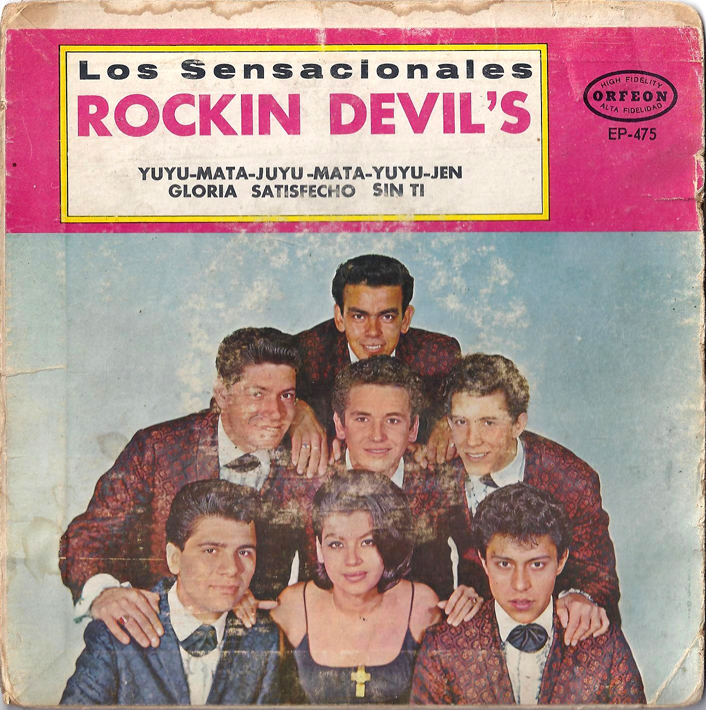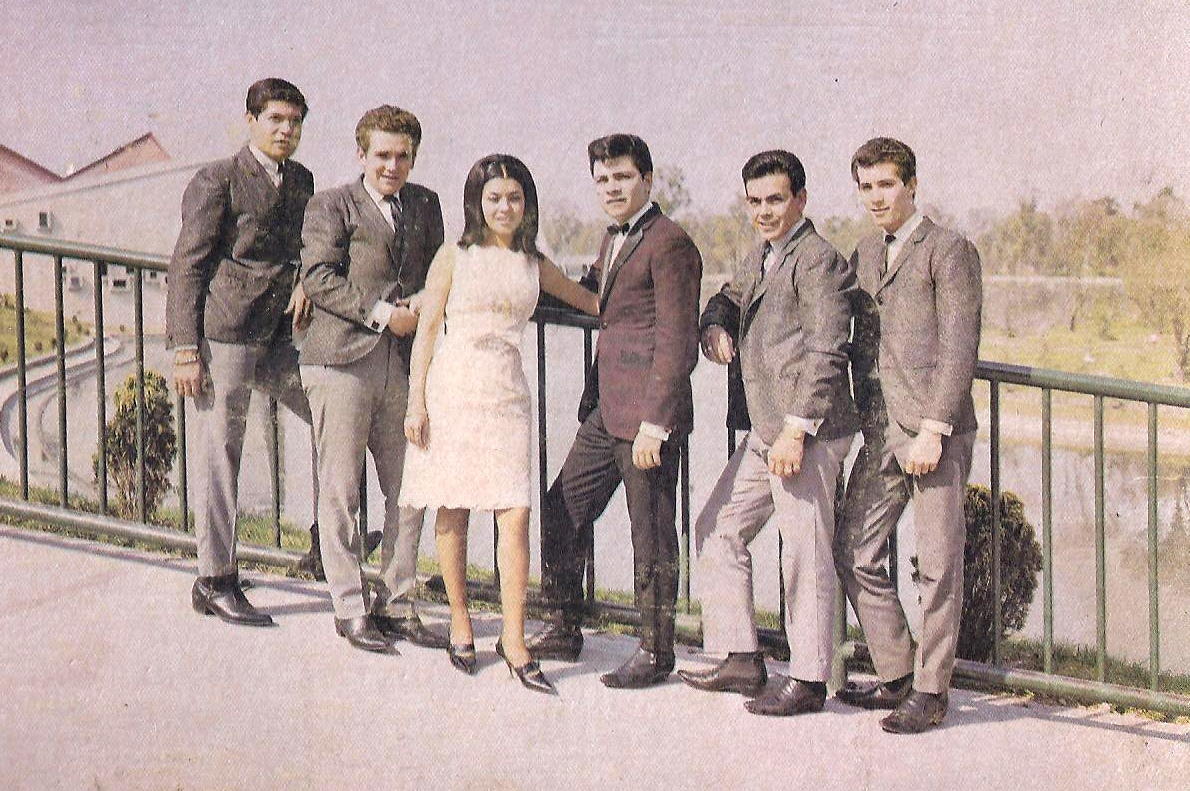 Los Rockin Devil’s were part of the Mexican wave of rock and roll that emerged in the early 60’s and gave a voice to the young rebellious soul that was waiting to explode. The band formed in 1962 in Tijuana, Mexico and original members included Francisco Estrada (vocals), Miguel Angel Osuna (bass), Jesus Olivas (vocals), Jaime Gonzalez Castellanos (organ and piano) Elias Amabilis Palma (guitar), Jose Luis Villanueva (drums), Francisco Campos (saxophone), Juam Campos (trumpet), Blanca Esstrada (vocals) and Irma Estrada (vocals).
Los Rockin Devil’s were part of the Mexican wave of rock and roll that emerged in the early 60’s and gave a voice to the young rebellious soul that was waiting to explode. The band formed in 1962 in Tijuana, Mexico and original members included Francisco Estrada (vocals), Miguel Angel Osuna (bass), Jesus Olivas (vocals), Jaime Gonzalez Castellanos (organ and piano) Elias Amabilis Palma (guitar), Jose Luis Villanueva (drums), Francisco Campos (saxophone), Juam Campos (trumpet), Blanca Esstrada (vocals) and Irma Estrada (vocals).
Los Rockin Devil’s share the same rock and roll genes along with other top bands in Mexico at the time Los Apson, Los Locos del Ritmo and Los Yaki who were also bringing that new revolutionary sound the younger generation was looking for to get away from the norm. Along with the music came the identity; Beatle-esque modish fashion and a James Dean rebellion were part of this new wave. Keep in mind these are the early stages of rock and roll and for society at the time, this music was the devil and brought out the crazy in people, that’s why the youth were so drawn to it; the youngsters were toying with the idea of lunacy. The youth of the time were itching for something to break, and here came this crazy raucous sound know as rock and roll.
Taking a cue from the early rockers of late 50’s Bill Haley and His Comets, Eddie Cochran and Gene Vincent, the new emerging bands of Mexico in the late 60’s picked up on their wild thundering sounds. Like any other band, the group started out making noise in the garage and soon had enough songs to play at parties, concerts, local events that soon turned into a promising project gaining popularity and a huge following. They were a huge band having so many members as were all the early rock groups: the standard bass, drums, guitars and vocals plus the horn section and additional vocalist. Although most of the Mexican rock and roll bands began as huge combos, eventually most of them did away with the horn section and kept it simpler, like the also emerging British Invasion bands The Beatles, The Kinks and the Rolling Stones who all had four to five members at the most.
 Orfeon Records signed Los Rockin Devil’s as rock and roll grew in popularity and their first album came out in 1964 to a huge response. By the time their second album “Los Sensacionales” was released in 1965, they were already riding the waves of popularity as their music was undeniably making strides of audible pleasures. The album is a mix of originals and the prominent standards all the bands were covering at the time. On the frat-rock favorite “Bule Bule,” the group turns it up with wild blaring horns and yelps, adding their own twist by changing the lyrics to the original song– a common practice in Mexican rock and roll bands as it was almost impossible to translate words that fit. It was much easier to make up words. Another standout track is their raucous cover of “Gloria” that is as raunchy as the original by the group Them, and better than The Shadows of Night version. The lyric changes on this song from the original “Like to tell you about my baby, you know she comes around” to “Yo conoci una gringa, muy Linda de verdad,” show that what was more important than getting the lyric correct, was the consonant of what is being said to fit the melody, something these bands figured out was going to be much easier route.
Orfeon Records signed Los Rockin Devil’s as rock and roll grew in popularity and their first album came out in 1964 to a huge response. By the time their second album “Los Sensacionales” was released in 1965, they were already riding the waves of popularity as their music was undeniably making strides of audible pleasures. The album is a mix of originals and the prominent standards all the bands were covering at the time. On the frat-rock favorite “Bule Bule,” the group turns it up with wild blaring horns and yelps, adding their own twist by changing the lyrics to the original song– a common practice in Mexican rock and roll bands as it was almost impossible to translate words that fit. It was much easier to make up words. Another standout track is their raucous cover of “Gloria” that is as raunchy as the original by the group Them, and better than The Shadows of Night version. The lyric changes on this song from the original “Like to tell you about my baby, you know she comes around” to “Yo conoci una gringa, muy Linda de verdad,” show that what was more important than getting the lyric correct, was the consonant of what is being said to fit the melody, something these bands figured out was going to be much easier route.
Their popularity had them broadening their opportunities and soon became movie starts playing along side actors as Javier Solis, Rosa Maria Vasquez and Manolo Muñoz in movies such as in Juventud sin Ley (aka Rebeldes A Go-Go) where they play their own music and Amor Ritmo de Go-Go. They would play as themselves usually the band at a club or Café.
By the late 60’s the band started to deteriorate because of alleged affairs within the band and group member s being removed because of drug issues, but later different incarnations and several lineup changes keep the band alive through the decades, and sometimes still play even today.
The Lost and Found
Los Rockin Devil’s
Los Sensacionales 1965
Daniel Salas

